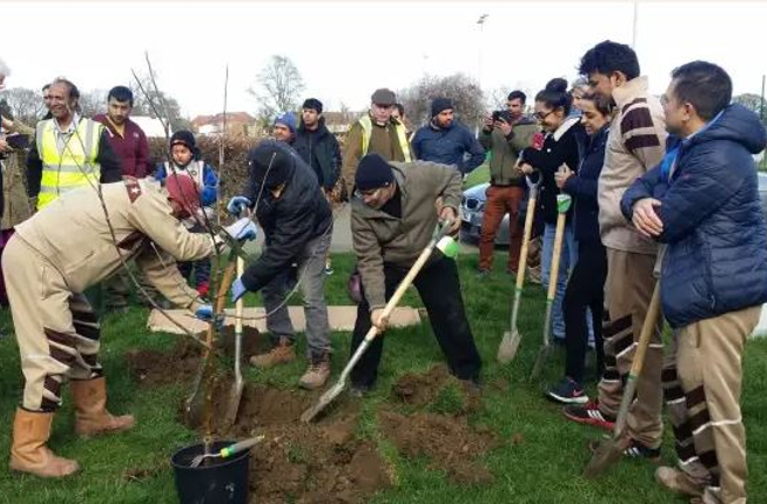Creating a new forest may seem a big ambition for a community group. In his latest blog, Transition Together’s Rob Hopkins talks to some of the Transition’s movements most prolific tree planters about how and why they’re seeking to make their communities shadier and leafier, and the benefits it brings for nature and people.
There is an often-quoted Chinese proverb that “the best time to plant a tree was 20 years ago. The second best time is today”. I have no idea how many trees have been planted by Transition groups since the movement began (17 years ago), and no way of knowing, but it must be a pretty huge number by now. But how do they organise to do it, and what lessons might they be able to plant on that might make it easier for you?
My first point of call was to chat with Mani from Southall Transition in London. The group began in late 2013, inspired by neighbouring Transition Ealing. One of their first ideas was ‘Southall Orchard Project’, an intention to plant five new orchards in five accessible places within five years.
In the first year (2015-16) they planted 41 trees in Southall Park with the involvement of many local groups and prominent local folks, including the Mayor. The following year, they planted another 41 trees at Southall Recreation Ground, involving the local nursery group and High School students. Mani told me how delightful it was to see older and much younger kids working together to plant the trees. They unveiled an information board next to the trees to explain what the project was about. This second phase was the first to be funded, with a £5000 grant from the Church Urban Fund.
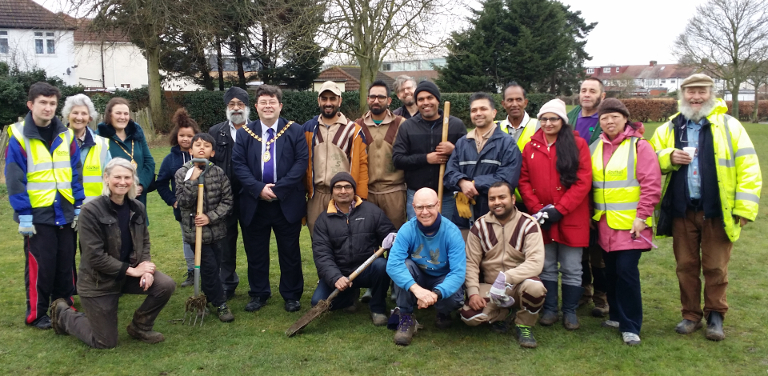
Southall Transition’s planting days became buzzing community events, drawing people together to get the trees in the ground.
By the time of the third planting (2018/19), the group were hitting their stride and becoming better at organising plantings, and also at seeking out funding. This was their most ambitious year, planting 54 trees in Jubilee Park, but also the most challenging, with snow when they first wanted to plant trees followed that summer by drought which meant they had to regularly water the young trees. In late 2019 they undertook their fourth planting, in Spike’s Bridge Park, just 25 trees this time, around the park’s perimeter, using the funding they raised for tree cages after some of their earlier plantings had been vandalised.
Over the winter of 2019/20, in Dormer Wells/Mount Pleasant, they planted 50 apple trees, all different varieties, just before the first lockdown. Covid naturally slowed them down, but they have since planted several trees as part of the ‘Our Southall’ regeneration of the Grand Union Canal, as well creating several Incredible Edible sites in Southall.
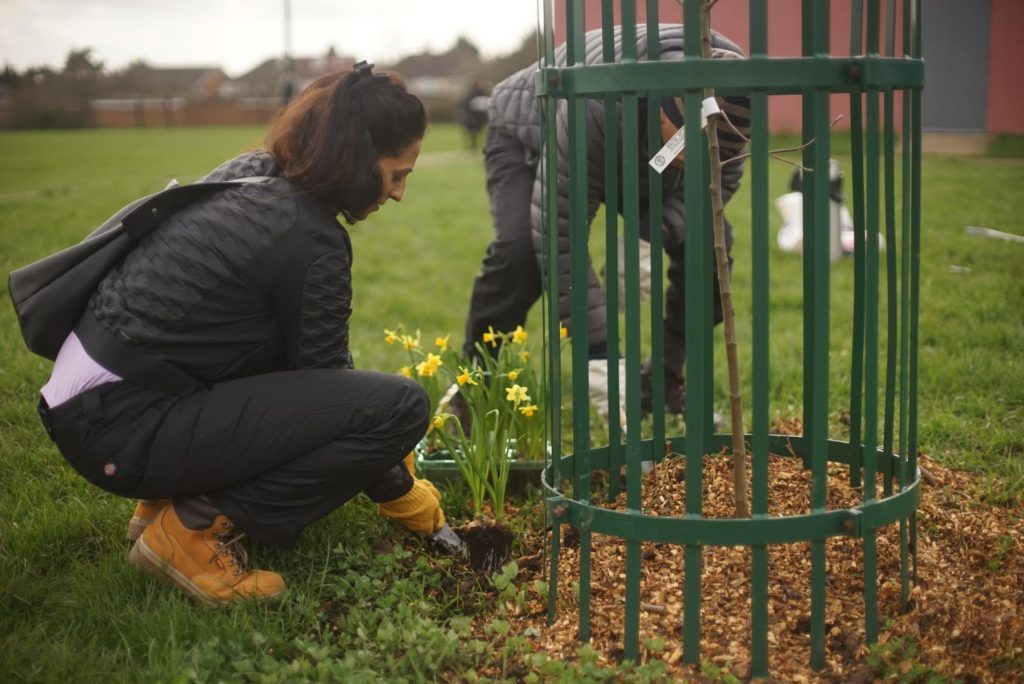
Daffodils and tree guards were installed around new saplings, part of Southall Transition’s fifth orchard site at Dormer Wells sports ground. Photo by James Morton
Mani said building good relationships with the right people at the local Council had been key to their success. In terms of ensuring enough people turn out to help get trees in the ground, he said: “the more you put in, the more you get out”. His advice for other groups was to recognise that organising tree plantings like this is a lot of work, and the importance of not quitting. The bit of tree wisdom that keeps him motivated is “plant a tree so you can sit in its shade”.
My second port of call to find some more ‘tree wisdom’ was to chat with Lisa Johnson of Transition Wilmslow. The group has several working groups, including the Tree Group, a Repair Café and a Community Market Garden. One of the group’s aspirations is to double tree cover in Wilmslow by 2040.
One of the challenges when planning tree plantings is to find good sites. The group started looking at Wilmslow High School were also interested in more trees and who had been very inspired by the Tiny Forest model, an approach developed in the 1970s by Dr Akira Miyawaki which creates dense fast-growing native woodlands. Around 600 trees are planted just a metre apart in an area around the size of a tennis court. The idea is that the trees grow very rapidly, lock up lots of CO2 and create an explosion of biodiversity.
EarthWatch helps plant Tiny Forests by preparing the ground, hosting the planting event and supporting the care of the site into the future. The cost of this support is around £25,000, so Lisa and colleagues approached the band The 1975, all of whom had been students at the school, and they agreed to pay for it. It still took two years to get permission from the local authority to do the planting due to the ‘risk averse’ approach they took to the idea.
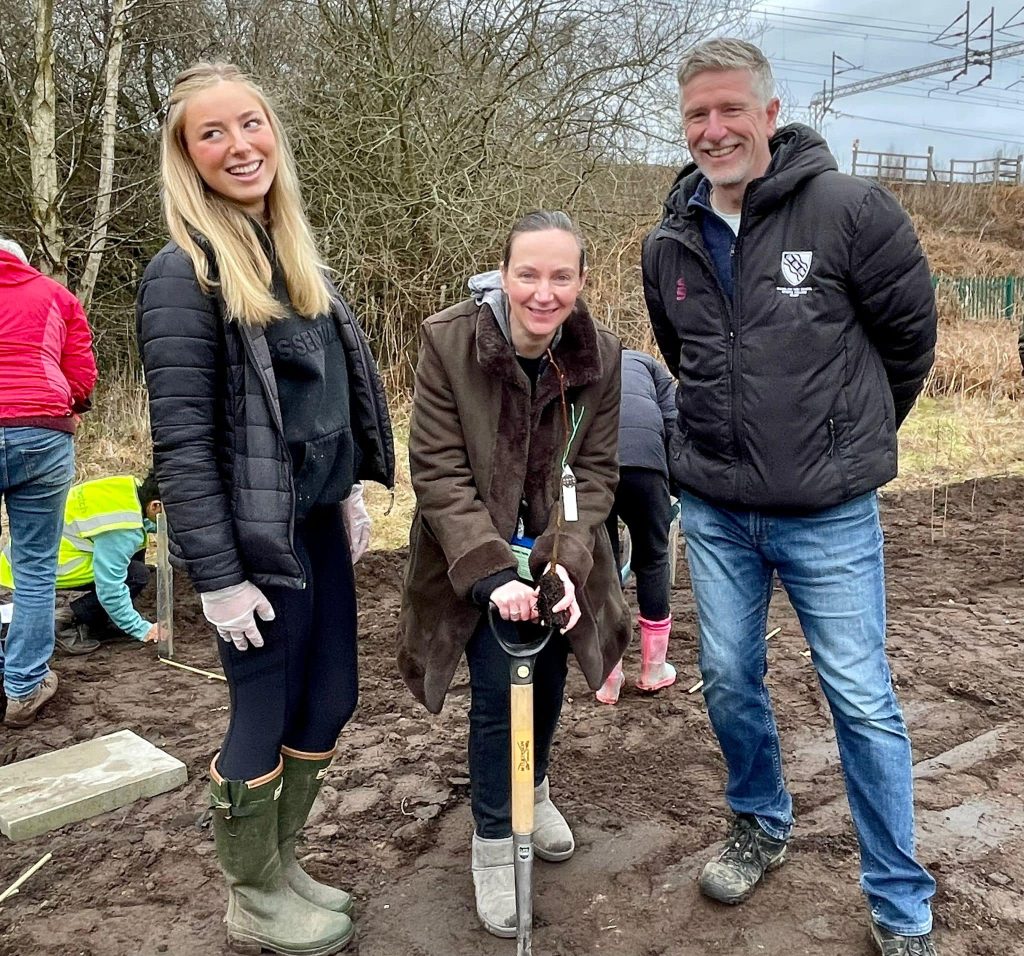
Some of the 200 volunteers who helped plant a Tiny Forest on Wilmslow High School grounds in February 2023.
But finally, in February 2023, the day came, and 200 people turned out to help. As Lisa told me, it was a “fantastic day”. Already the group are eyeing up an adjoining piece of land for planting next year. I asked Lisa what her advice would be for other groups. “Finding land that is permanent can be a real struggle”, she told me. In a different project, the group planted trees in a place called the Secret Garden, only to be told, a couple of years later, the site was to be sold. “So find sites that you can be sure are safe and secure” she added.
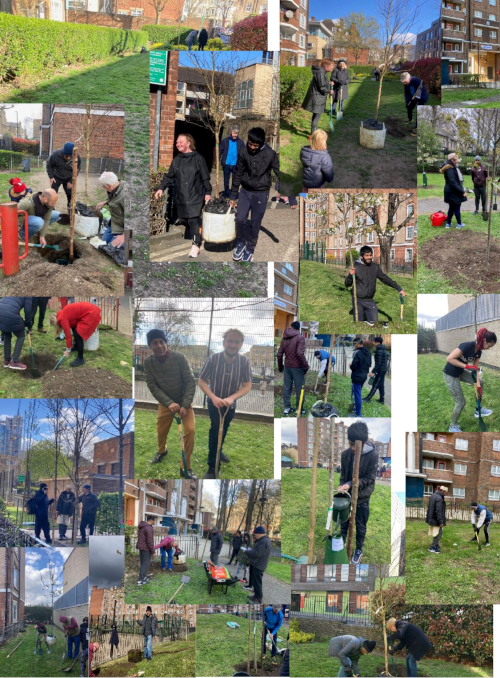
Different Transition groups take different approaches to increasing the number of trees in their area. Transition Town Hastings’ aims to transform the their town into an orchard, planting fruit trees across the community over a six-month period. Transition Woodbridge has also been planting fruit and nuts trees. Transition Marlow’s ‘Releaf’ project doesn’t just plant trees, it also offers trees, funded by the local Council, to people who want to plant their own in their own gardens.
Think & Do, a partner of Transition Kentish Town, has been planting trees across estates in their part of London, and training young people as Camden Foresters, paid to water and look after the saplings. Transition Town Ilford have planted a forest garden in Valentines Park which they use to host many activities. Transition Town Wellington have planted up a number of sites now around Wellington, including the very ambitious Fox’s Field, after an extensive community consultation.
Our third story takes us to Bolton and the Great Lever Community Fruit Trees Project. Steve Jones, who has a long background in Bolton community food growing and permaculture projects with social housing communities, such as the Community Roots Permaculture Project. During Covid, an idea he had been chewing over for a while came back to him: planting fruit trees everywhere on his estate. “Now is the time to do this,” he thought. The goal is to make it as easy as possible for working class families to have fruit trees in their own gardens, because they lock up carbon, build family wellbeing and provide free food in a cost of living crisis.
With some support from Transition Together’s Seed Funding, Steve and his colleague Ben Blackburn spend a day a week going door-to-door on their Council estate. When the door opens, they simply say “hello, good morning. We are running a small community project where we’re planting fruit trees free of charge in peoples’ gardens. Would you like one?” So far they have planted 45 trees, many with residents getting stuck into the digging. Steve said the more they plant, the greater the connections they build, and the more trusted they become.
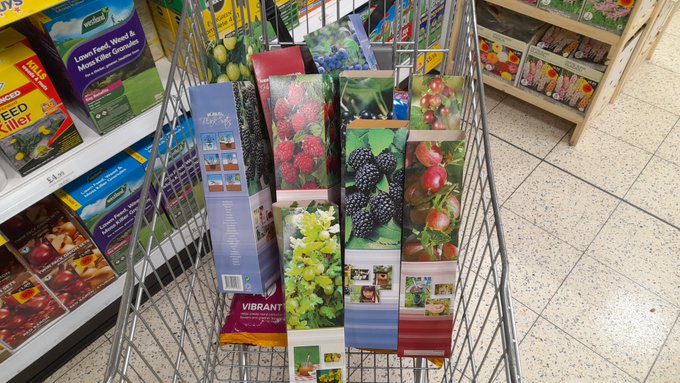
Supermarket fruit trees designed for gardens across Great Lever estate in Bolton.
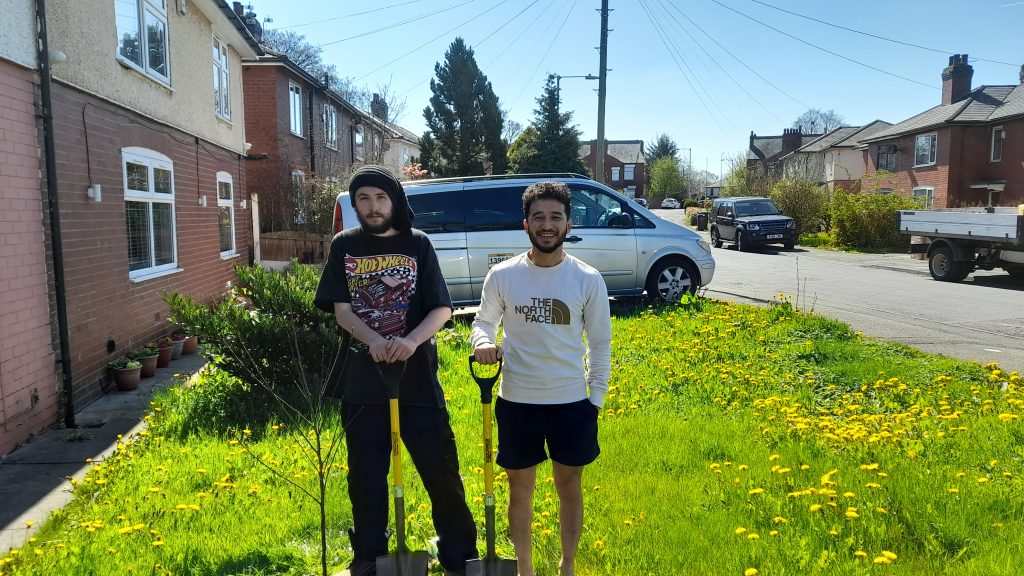
Often residents are keen to help Ben and Steve plant the trees supplied by Community Roots Permaculture
Next year they plan to approach the City Council for support and engage with the Council of Mosques in Bolton. They found that in the Koran there are passages that speak of gardens with fruit trees as providing food and peace and a place to be closer to God. In many Muslim cultures it’s also considered good luck to have a fruit tree in your garden, something they will build upon. Interestingly, white working class families tend to choose apples and pears, while Asian and Middle Eastern communities tend to choose plums and cherries.
Steve told me a story about two of his neighbours who don’t get on with each other, but who were both interested in having a fruit tree. Steve planted a tree in both gardens – varieties of apples that need each other in order to be able to pollinate.
Future plans include jam-making workshops in peoples’ gardens and spreading their work to neighbouring estates. His advice to others wanting to do the same things is to make whatever funding you have go as far as possible. Rather than buying fruit trees from tree nurseries, their approach is to buy them from budget stores like Lidl, Aldi and Morrisons, where they cost about £6 each rather than £25-£30 each.
From everyone I have spoken to who has either co-ordinated, or been part of, a community tree planting activity, it is clear it’s one of the most satisfying things we can do, where we can watch the impacts literally grow over time. As Steve in Bolton put it, “this is joyous. It’s not work. It’s pure joy”. As he recently tweeted, “If a Philanthropist sponsored me for a £1,000 a month I could walk away from Universal Credit and being forced to do tedious meaningless work and concentrate on community and eco-system repair in our area … it would give me time to do great work here”.
So, what are you waiting for? Grab yourself a copy of Martin Crawford’s ‘Creating a Forest Garden’ and get to it!
Teaser photo credit: Author supplied.


